Short Verdict:
“Well-intentioned but heavy-handed, Nizharkudai tugs at emotional threads without giving them space to breathe.”
Synopsis:
Nizharkudai centers around an ambitious young couple, Lancy (Kanmani) and Niranjan (Vijith), who dream of settling in the US, but their pursuit of success comes at a cost — their fragile daughter Nila’s well-being. Nila suffers from a serious medical condition: she has seizures when emotionally distressed. When an unsuitable caregiver causes a scare, the couple hires Jyoti (Devyani), a Sri Lankan refugee living in an old age home. Jyoti forms a tender, heartfelt bond with the child — a relationship that becomes the emotional core of the film. But when Nila is suddenly kidnapped, the film shifts gears into a formulaic investigation led by Inspector Ilavarasu.
Performances:
Devyani is the film’s emotional anchor. Her portrayal of Jyoti is subtle, heartfelt, and convincing. She never oversells the character’s pain or affection, making her bond with Nila feel genuine. Kanmani and Vijith, however, struggle with characters that are underwritten. Their portrayal of detached parents comes off more mechanical than conflicted. Ilavarasu, playing the cop, delivers a serviceable performance, although his role is more functional than memorable.
Strengths:
Emotional Core: The Jyoti–Nila relationship is beautifully rendered and holds emotional weight.
Lead Performance: Devyani shines with grace and quiet depth.
Important Themes: The film attempts to explore complex topics — parental neglect, emotional abandonment, refugee struggles, and ambition-induced guilt.
Weaknesses:
Preachy Tone: The film often sacrifices narrative flow for moral commentary.
Predictable Plot: The investigative angle is filled with clichés and obvious red herrings.
Unconvincing Conflict: The central couple’s conflict lacks authenticity, making their decisions feel forced.
Melodramatic Devices: The use of a child in constant peril as a tool to escalate tension feels exploitative.
Direction & Writing:
The direction attempts sincerity but falters due to an over-reliance on dramatics. The writing feels didactic — more interested in making a point than telling a compelling story. The dialogue occasionally slips into sermonizing, and the story’s pace suffers due to unnecessary detours. The climax, which reveals Nila’s grandparents as the kidnappers, doesn’t feel earned — more like a quick resolution than a thoughtful twist.
Cinematography & Music:
Visually, the film does justice to its themes. The contrast between sterile urban spaces and the warmth of Jyoti’s scenes with Nila is subtly effective. The music is serviceable but doesn’t elevate the drama — it often over-signals emotion rather than letting scenes breathe.
Final Thoughts:
Nizharkudai is a film with its heart in the right place, but it leans too heavily on melodrama and overt messaging. While it presents a touching bond between a child and her unlikely guardian, the rest of the film struggles to maintain emotional authenticity. It’s a story that could’ve moved you deeply — if only it trusted its characters more than its agenda.










